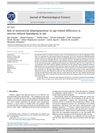
Female rats showed more panic-related behavior than males, influenced by hormonal cycles and certain drugs.
 November 2023 in “Scientific reports”
November 2023 in “Scientific reports” The research identified and described a gene important for hormone conversion in endangered catfish, which varies in activity during different reproductive stages and after hormone treatment.
 3 citations,
July 2010 in “Clinical Neuropharmacology”
3 citations,
July 2010 in “Clinical Neuropharmacology” Finasteride helps treat eyelid spasms.
 February 2024 in “Scientific Reports”
February 2024 in “Scientific Reports” Cinnamic acid may help hair grow by activating oxytocin receptors.
Neurosteroids help regulate oxytocin levels, especially during stress and pregnancy, to protect against premature labor.
 14 citations,
March 2017 in “Brain research”
14 citations,
March 2017 in “Brain research” Progesterone and its byproducts control a specific receptor in the brain independently of progesterone receptors, affecting conditions related to the menstrual cycle.
 26 citations,
September 2012 in “Epilepsy & Behavior”
26 citations,
September 2012 in “Epilepsy & Behavior” Finasteride worsens seizures in epilepsy rats and speeds up epileptogenesis in mice.
 3 citations,
October 2010 in “Epilepsy Currents”
3 citations,
October 2010 in “Epilepsy Currents” Altered metabolism can help control seizures by changing brain signaling and energy use, suggesting new treatments for epilepsy.
 October 2010 in “Epilepsy Currents”
October 2010 in “Epilepsy Currents” Ketogenic diet, neurosteroids, and HMGB1-TLR4 signaling pathway are potential targets for new epilepsy treatments.
 7 citations,
August 2006 in “Experimental Neurology”
7 citations,
August 2006 in “Experimental Neurology” Finasteride blocks deoxycorticosterone's anticonvulsant effects in infant rats, but indomethacin doesn't.
1 citations,
March 2018 in “F1000Research” Diabetic neuropathy in mice is linked to poor mitochondria function and lower brain hormone production.
4 citations,
April 2017 in “F1000Research” Mitochondrial problems in diabetic nerve damage might cause pain by lowering the production of certain nerve-related steroids.
 27 citations,
July 2008 in “Neuroscience”
27 citations,
July 2008 in “Neuroscience” Finasteride given to baby rats causes anxiety-like behavior and worsens learning from punishment in adult rats.
 4 citations,
November 2018 in “Journal of pharmacological sciences”
4 citations,
November 2018 in “Journal of pharmacological sciences” Mild exercise reduces pain in older rats through a brain chemical, while intense exercise reduces pain in all rats through a different pain-blocking process.
 6 citations,
February 2019 in “Scientific reports”
6 citations,
February 2019 in “Scientific reports” A brain-produced steroid causes increased scratching in mice with a skin condition similar to eczema.
Neonatal allopregnanolone and stress affect behavior differently in adolescence and adulthood.
August 2022 in “Theriogenology” Neurosteroids affect prolactin levels in sheep differently depending on stress and pregnancy conditions.
 November 2019 in “Synapse”
November 2019 in “Synapse” Brain-made chemicals can control nerve cell function differently in various parts of a mouse's brain, which may help us understand neurological conditions.
12 citations,
February 2017 in “Journal of neuroscience research” Removing certain brain receptors in mice worsens seizure severity and response to treatment during hormone withdrawal.
 12 citations,
April 2018 in “Physiology & Behavior”
12 citations,
April 2018 in “Physiology & Behavior” Finasteride raises suicide-linked aggression and stops clozapine's positive effects in schizophrenia animals.
 5 citations,
October 2020 in “Brain Research Bulletin”
5 citations,
October 2020 in “Brain Research Bulletin” Etifoxine, an anxiety drug, can lessen brain inflammation and cognitive issues in mice, partly by increasing production of protective brain steroids.
 1 citations,
March 2016 in “Neurotoxicity Research”
1 citations,
March 2016 in “Neurotoxicity Research” Finasteride may protect brain and improve behavior in rats with liver failure.
 34 citations,
November 2011 in “Alcoholism: Clinical and Experimental Research”
34 citations,
November 2011 in “Alcoholism: Clinical and Experimental Research” Three drugs change mice's alcohol drinking patterns by affecting GABAA receptors.
 32 citations,
February 2019 in “Journal of neurochemistry”
32 citations,
February 2019 in “Journal of neurochemistry” Sex hormones affect brain injury differently in males and females.
January 2024 in “International journal of molecular sciences” A brain-made hormone can protect against memory-related brain damage caused by harmful proteins.
 25 citations,
March 2017 in “Steroids”
25 citations,
March 2017 in “Steroids” Allopregnanolone increases growth and changes gene activity in human brain cancer cells.
 36 citations,
June 2001 in “Neuroscience Letters”
36 citations,
June 2001 in “Neuroscience Letters” Finasteride may affect fetal brain development and increase arousal, but more research is needed for safety confirmation.
 38 citations,
April 2018 in “Psychopharmacology/Psychopharmacologia”
38 citations,
April 2018 in “Psychopharmacology/Psychopharmacologia” Blocking CRF-R1 can reduce alcohol intake in stressed mice.
 11 citations,
August 2019 in “BMJ”
11 citations,
August 2019 in “BMJ” Post-finasteride syndrome causes sexual, physical, and psychological symptoms, but more research is needed to understand its causes and connection to finasteride.
December 2022 in “JAMA network open” 5α-Reductase inhibitors may increase depression risk but not dementia or suicide.





















